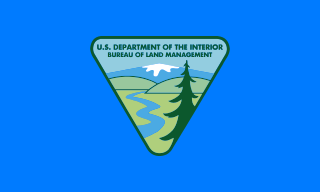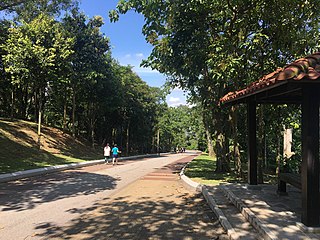
The Bureau of Land Management (BLM) is an agency within the United States Department of the Interior responsible for administering U.S. federal lands. Headquartered in Washington, D.C., the BLM oversees more than 247.3 million acres (1,001,000 km2) of land, or one-eighth of the United States's total landmass.
Governance is the process of making and enforcing decisions within an organization or society. It encompasses decision-making, rule-setting, and enforcement mechanisms to guide the functioning of an organization or society. Effective governance is essential for maintaining order, achieving objectives, and addressing the needs of the community or members within the organization. Furthermore, effective governance promotes transparency, fosters trust among stakeholders, and adapts to changing circumstances, ensuring the organization or society remains responsive and resilient in achieving its goals. It is the process of interactions through the laws, social norms, power or language as structured in communication of an organized society over a social system. It is done by the government of a state, by a market, or by a network. It is the process of choosing the right course among the actors involved in a collective problem that leads to the creation, reinforcement, or reproduction of acceptable conduct and social order". In lay terms, it could be described as the processes that exist in and between formal institutions.

Forestry laws govern activities in designated forest lands, most commonly with respect to forest management and timber harvesting. Forestry laws generally adopt management policies for public forest resources, such as multiple use and sustained yield. Forest management is split between private and public management, with public forests being sovereign property of the State. Forestry laws are now considered an international affair.
Canada Lands Company Limited is a self-financing federal Crown corporation reporting to the Parliament of Canada through Public Services and Procurement Canada. The company is responsible for managing property on behalf of the federal government, conducting public consultation and integrating properties back into their surrounding communities for development. Most of its assets are located in Canadian urban centres, and are sold after the CLC revalued the property by providing managerial support and subsidizing immediate costs such as decontamination. However, the company retains ownership of some of Canada's most valued properties, such as Downsview Park, the CN Tower, the Old Port of Montreal and the Montreal Science Centre, from which it draws rental and hospitality revenues.

The Reno-Sparks Indian Colony in Nevada was established in the early 1900s by members of related tribes who lived near Reno for work; they became a federally recognized tribe in 1934 after forming a government under the Indian Reorganization Act.

Bukit Kiara is a densely forested area of Kuala Lumpur, Malaysia. The area is in proximity to the suburbs of Bukit Damansara, TTDI, Mont Kiara, Sri Hartamas, and Bangsar. Bukit Kiara has often been described as one of the last remaining 'green lungs' of Kuala Lumpur, boasting many jungle trails, pristine rivers and streams and abundant native wildlife. Despite rapid housing and commercial development in neighbouring Mont Kiara, Bukit Kiara is still known as a natural oasis away from the hustle and bustle of Kuala Lumpur.

Environmental planning is the process of facilitating decision making to carry out land development with the consideration given to the natural environment, social, political, economic and governance factors and provides a holistic framework to achieve sustainable outcomes. A major goal of environmental planning is to create sustainable communities, which aim to conserve and protect undeveloped land.
Great Northern Way Campus Ltd (GNWC) is a private limited company and educational enterprise located in Vancouver, British Columbia, Canada. It is the offspring of a consortium of four local academic institutions that has attracted significant public and private funding. The company is the trustee of the Great Northern Way Campus Trust, whose stated purpose is to create "a centre of convergence for arts and culture, digital media and the environment." At present, it manages a Master's degree in Digital Media, which admitted its first students in the Fall of 2007.

M. C. Mehta v. Kamal Nath was a landmark case in Indian environmental law. In the case, the Supreme Court of India held that the public trust doctrine applied in India.
Rail Land Development Authority (RLDA) is a statutory authority, under the Indian Ministry of Railways, set-up by an Amendment to the Railways Act, 1989. It is responsible for creating assets for Indian Railways through the development of vacant railway land for commercial use to generate revenue by non-tariff measures. RLDA's mission is to be a leader in creating value through the redevelopment of land and air spaces – residential, commercial, and transportation hubs. RLDA's expenses are covered through grants provided by Indian Railways. RLDA transfers the total earnings generated from the development of railway land to Indian Railways. The Indian Planning Commission has computed an approximate budget of around Rs 20 to 272 billion for the development of infrastructure nationally during the 11th plan period. Out of this budget, the Railways has an anticipated requirement of Rs 2800 billion. 83% of this requirement is supposed to be met through public sector investment. In order to generate the remaining investment required to meet the budget mentioned above, the Indian Railways set up the Rail Land Development Authority on 1 November 2006. Ved Prakash Dudeja, a 1986 batch IRSE officer, is Vice Chairman of RLDA. He joined RLDA on 7 April 2019.
Kerala is a state on the southwestern coast of India. It is known for its high literacy rate, low infant mortality rate, and long life expectancy. Kerala has also been a pioneer in the field of decentralization and participatory local democracy.
Municipal or local governance refers to the third tier of governance in India, at the level of the municipality or urban local body.

The Marine Management Organisation (MMO) is an executive non-departmental public body in the United Kingdom established under the Marine and Coastal Access Act 2009, with responsibility for English waters. The MMO exists to make a significant contribution to sustainable development in the marine area, and to promote the UK government's vision for clean, healthy, safe, productive and biologically diverse oceans and seas. The MMO aims to focus all of its activities and resources to meet its mission of enabling sustainable growth in the UK's marine area through 5 strategic outcomes:
The management of Jamaica's freshwater resources is primarily the domain and responsibility of the National Water Commission (NWC). The duties of providing service and water infrastructure maintenance for rural communities across Jamaica are shared with the Parish Councils. Where possible efficiencies have been identified, the NWC has outsourced various operations to the private sector.

Cyberpark Kozhikode is a Government of Kerala owned business park for the promotion and development of investment in Information Technology (IT) and Information Technology Enabled Services (ITES) industries in the Malabar region of Kerala. It was registered under the Societies Act 1860 on January 28, 2009. In addition to this, it has a General Body and a Board of Governors, both of which include top officials of the government.Cyberpark, Kozhikode has been envisioned and conceptualized as a major IT hub catering to the northern part of Kerala for the development of IT/ITeS sector in the state. After a trail-blazing performance with the success of Technopark, Trivandrum and Infopark, Kochi under Kerala IT.
State trust lands were granted by the United States Congress to states upon entering the Union. These lands were designated to support essential public institutions which are primarily public schools. State trust land managers lease and sell these lands to generate revenue for current and future designated beneficiaries. Predominantly found in the western United States, 46 million acres of land are currently designated as trust lands and the proceeds from the lease and sale of these lands are distributed into a state's permanent fund and used for many purposes.

The executive branch of the government of Puerto Rico is responsible for executing the laws of Puerto Rico, as well as causing them to be executed. Article IV of the Constitution of Puerto Rico vests the executive power on the Governor—whom by its nature forms the executive branch.

The Federal Lands Jobs and Energy Security Act is a bill that would require the Bureau of Land Management (BLM) to establish certain fees for activities related to the development of oil and gas on federal lands. A portion of those amounts along with a portion of fees from renewable energy projects on federal lands would be available to the agency, subject to appropriation, to cover the costs of activities aimed at increasing energy development on federal lands. The bill also would exempt lawsuits related to energy production on federal lands from the Equal Access to Justice Act (EAJA). In addition, the legislation would require the BLM to offer for sale at least 25 percent of onshore federal lands nominated by firms for oil and gas leasing. It was introduced in the United States House of Representatives during the 113th United States Congress. President Barack Obama threatened to veto the bill on November 19, 2013.

Digital India is a campaign launched by the Government of India to make its services available to citizens electronically via improved online infrastructure and by increasing Internet connectivity. The initiative includes plans to connect rural areas with high-speed internet networks. It consists of three core components: the development of secure and stable digital infrastructure, delivering government services digitally, and universal digital literacy.

Conservation banking is an environmental market-based method designed to offset adverse effects, generally, to species of concern, are threatened, or endangered and protected under the United States Endangered Species Act (ESA) through the creation of conservation banks. Conservation banking can be viewed as a method of mitigation that allows permitting agencies to target various natural resources typically of value or concern, and it is generally contemplated as a protection technique to be implemented before the valued resource or species will need to be mitigated. The ESA prohibits the "taking" of fish and wildlife species which are officially listed as endangered or threatened in their populations. However, under section 7(a)(2) for Federal Agencies, and under section 10(a) for private parties, a take may be permissible for unavoidable impacts if there are conservation mitigation measures for the affected species or habitat. Purchasing “credits” through a conservation bank is one such mitigation measure to remedy the loss.











